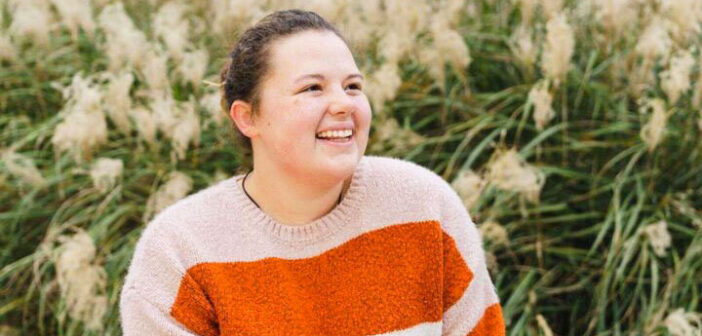Presenting research at the United Nations; hosting a healing workshop; attending protests; and studying political science and women, gender and sexuality studies are just a few things Amber Brose, ‘24, has done in her time at Lehigh.
As a queer person from the small, rural town of York, Pennsylvania, Brose said it was hard for her to grow up in an unsupportive environment. She said she knew she wanted to be a part of social change and started by joining the borough council in her town to start making a difference.
One of the first things Brose did as an activist was start a petition to change her high school’s mascot, which depicted a Native American, causing a lot of controversy in her hometown. Her petition was successful, and the school’s mascot was changed to an arrowhead-like symbol.
“All of the little things really added up,” Brose said. “I don’t think it was ever a question for me. I knew I was going to do (activism work) when I went to college. I knew that this is what I have to do.”
Brose was inspired to continue making an impact when she came to Lehigh because she saw the positive change that resulted from her work.
She has been a Marcon Fellow since June 2022 when Holona Ochs, political science professor and director of the Marcon Institute, asked her to join a team to research the effects of mass incarceration on those impacted by the criminal justice system.
Brose was selected to present her research, “Shifting Perspectives on the Criminal Legal System in the Lehigh Valley” at the United Nations’ International Day of Peace Youth Observance with the theme of “End racism. Build peace.”
Brose’s research showed there are negative effects of punitive measures for impacts all parties involved, even for those who are employed within the legal system.
Ochs met Brose in her End of Policing course in the spring of 2022 before she was a Marcon Fellow. Since then, they’ve worked together both in the institute and in the classroom.
“She can uplift other people, and when she accomplishes something, she shows other people how she did it and makes space for them…When they achieve it, she celebrates them,” Ochs said. “I mean that’s exactly the kind of leadership we need right now.”
Ochs has made the curriculum for her classes based on American author and theorist bell hooks’ principles of love, care, commitment, knowledge, responsibility, and trust. She said she firmly believes Brose embodies all of these qualities in every interaction and relationship she has.
This semester, Brose said she is an intern in the Office of Survivor Support and Intimacy Education. She also plans on collaborating with the Douglass Dialogues for a conversation on history and empathy with sex work in addition to publishing with the Center for Gender Equity’s feminist magazine.
“I really like opening the eyes of students regarding the subject,” Brose said.
She is the president of the Student Political Action Coalition and works at the Lehigh Bookstore and Saxbys cafe when she isn’t participating in protests or working on her many projects.
Alongside her best friend and roommate, Byron Bishop, ‘25, Brose is a member of Break the Silence. They also both work at the Pride Center and attend trauma healing yoga every week.
“She’s really cool and inspiring,” Bishop said. “In a time where we’re supported (in) just learning how to do the things that (we) want to do, she’s already out in the world doing the things that she wants to do.”
In the little free time Brose has, she said she thrifts and enjoys binge-watching shows like “H2O: Just Add Water” and “Doctor Who” with Bishop.
Brose said she will be presenting her senior thesis, “Self-care and activism: neoliberal, consumerist, or feminist praxis,” at the annual meeting and conference of the National Women’s Studies Association in Baltimore on Oct. 27.
She said her thesis is an autoethnography, a form of data collection consisting of journaling. Brose journaled for 90 days, using specific prompts each day such as “What was the most memorable moment of your day?” and “What impact do you think you had on the community today?”
“It’s really important that on the side, in order to continue doing that work, you’re also making sure you understand which practices are the best for yourself,” Brose said. “So definitely what I’m interested in…(is) which practices have proven to be the most effective for me. And obviously, this would change based on the person.”
As part of her healing journey, she said she hosts a workshop called Healing Together, where every month she tries out different healing methods and rituals to help deconstruct the trauma that comes with being an activist and living through the COVID-19 pandemic.
“A large part of what being an activist is is making space for others and helping them in a time of need,” Brose said. “This can weigh a lot on people’s minds and it means that activists experience burnout and motivation problems at very high rates.”
Brose said she hopes to turn her skill for providing healing workshops into a formal position at the Marcon Institute to continue providing a community of healing on campus past her graduation.
She said she is in the process of applying to graduate schools and hopes to be back on campus next year to work toward a master’s degree in public policy at Lehigh.






Comment policy
Comments posted to The Brown and White website are reviewed by a moderator before being approved. Incendiary speech or harassing language, including comments targeted at individuals, may be deemed unacceptable and not published. Spam and other soliciting will also be declined.
The Brown and White also reserves the right to not publish entirely anonymous comments.